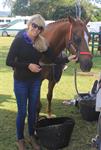Understand how and why animals behave as they do
- Learn about animal behaviour - external influences, motivation, perception.
- Improve your knowledge of animal psychology.
- This is an ideal course for those who wish to work with animals or who want to understand animal behaviour and train animals.
- Course duration: 600 hours of self paced study. Start at any time and study at your own pace.
Students will study 4 Core (compulsory) modules and select 2 Elective modules. Please click on the links below for more information on each individual module. Each module is available to study individually as a short course in its own right.
WHY STUDY ANIMAL PSYCHOLOGY?

Anyone who has a pet or works with animals in any capacity, will benefit from understanding more about how animals think and behave. This applies equally to any type of animal; whether in captivity or running free, whether in a home, on a farm, or in the wild.
People tend to have empathy with animals. They look at another living thing, and unconsciously (or sometimes consciously) think that the only difference between themselves and the animal is their inability to talk to each other. Animals are however different to people. They have different bodies, different brains, different instincts and their natural behaviours will not always be intentional in the same way that we think of actions being intentional.
Do Animals Understand Human Language?

The short answer is no. It is questionable whether even primates which have been trained to respond to human language actually understand any language. Most likely, they are responding to rewards. On a daily basis, different forms of interaction and communication between humans and other animals can be observed. When a human speaks to an animal, the animal does not understand individual words but it can be trained to interpret the message the human is trying to convey.
Communication between animals and humans occurs both ways; a human will express its own desires by using words, tone of voice and body language (which is how an animal can interpret a humans command), while humans have acquired the ability to learn to “read” an animal’s expression by its sounds, gestures and behaviour.
An example of differentiation can be between the bark of a dog when it’s angry and the same dog barking when it’s playing. Another is when a human simply tells its dog to “go outside” with a calm tone of voice (the dog will obey and it will know it is meant to go outside and everything is still fine), and a human yelling at its dog to “go outside” with a loud tone of voice (the dog will feel like it’s done something wrong and it will step outside ashamed and sorry). The main point here is - how does that dog know what “go outside” means? This is when intelligence falls into place; the dog will be capable of understanding what the person means due to being repeatedly told and shown to go outside, and/or by an added expression which may be demonstrated by pointing the way out with an extended arm and finger (along with a serious facial grimace).
Another example can be noted by humans and horses during equestrian training and spectacles. A horse will learn to interpret what its rider wishes it to do by specific commands expressed through the legs, hands, voice and seat, also referred to as “rider’s aids”. The horse’s response will vary depending on the intensity of each command (e.g. a slight touch of the leg). A relaxed and effortless posture, on the other hand, will enable the rider to absorb and interpret the horse’s movements, as well as to “read into” any objection the horse has towards these commands.
Use this course to:
- Enhance a career or business you are already involved with.
- Prepare for a new career or business; improve employment prospects.
- Lay a foundation for more advanced studies in animal management or psychology.
If you have any questions ...
You can enrol at any time and as you determine when you study, you can fit your studies around your existing life and work commitments.
If you have any questions, or to find out more get in touch with us today.
Phone us on (UK) 01384 442752 or (International) +44 (0) 1384 442752, or submit your questions to our specialist Animal and Psychology tutors - they will be happy to help you in choosing the right course to suit your own career goals.